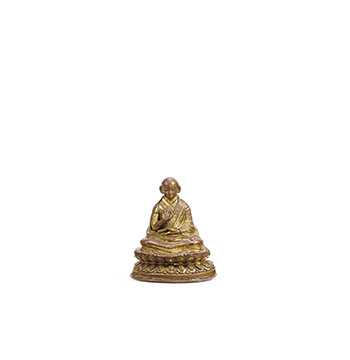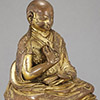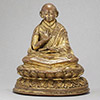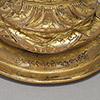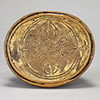Catalogue Note
A Tibetan Gilt Bronze Figure of a Guru
15-16 Century
Guru is a Sanskrit term that connotes someone who is a teacher, guide, expert, or master of certain knowledge or field, Lama in Tibetan. In pan-Indian traditions, guru is someone more than a teacher, traditionally a reverential figure to the student, with the guru serving as a counselor, who helps mold values, shares experiential knowledge as much as literal knowledge, an exemplar in life, an inspirational source and who helps in the spiritual evolution of a student. The term also refers to someone who primarily is one's spiritual guide, who helps one to discover the same potentialities that the guru has already realized.
This figure of a guru was made in rose copper, portraying the guru with a delicate face in the shape of a full moon. The guru seated in vajraparyankasanam on a lotus throne, left hand holding a sacred book in dhyana mudra and right hand put before his chest in Dharmachakra Mudra. He’s wearing voluminous outer and inner robes secured at the waist with a sash, patterns of entwined lotus flower and stems decorating it, complicated but not chaotic. The drapery folds into a triangle shape before him, which is very rare to see, showing the sense of mass of the frock efficiently. At the bottom of the lotus throne there is a script, stating the name of the guru. According to analysis from different perspectives, this is probably a guru of Kagyu School.
This figure is preserved in a perfect condition, with the original sealing weld. Because of the long history such figure with original sealing weld is extremely rare, suggesting high religious value.
15-16 Century
Guru is a Sanskrit term that connotes someone who is a teacher, guide, expert, or master of certain knowledge or field, Lama in Tibetan. In pan-Indian traditions, guru is someone more than a teacher, traditionally a reverential figure to the student, with the guru serving as a counselor, who helps mold values, shares experiential knowledge as much as literal knowledge, an exemplar in life, an inspirational source and who helps in the spiritual evolution of a student. The term also refers to someone who primarily is one's spiritual guide, who helps one to discover the same potentialities that the guru has already realized.
This figure of a guru was made in rose copper, portraying the guru with a delicate face in the shape of a full moon. The guru seated in vajraparyankasanam on a lotus throne, left hand holding a sacred book in dhyana mudra and right hand put before his chest in Dharmachakra Mudra. He’s wearing voluminous outer and inner robes secured at the waist with a sash, patterns of entwined lotus flower and stems decorating it, complicated but not chaotic. The drapery folds into a triangle shape before him, which is very rare to see, showing the sense of mass of the frock efficiently. At the bottom of the lotus throne there is a script, stating the name of the guru. According to analysis from different perspectives, this is probably a guru of Kagyu School.
This figure is preserved in a perfect condition, with the original sealing weld. Because of the long history such figure with original sealing weld is extremely rare, suggesting high religious value.
